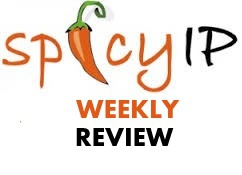Image may be NSFW.
Clik here to view. Highlight of the Week
Highlight of the Week
This week’s highlight was our coverage of the Fourth Global Congress on IP and the Public Interest, for which SpicyIP was the media partner.
In the lead-up to the event, we had Job Michael Mathew’s interview of Jayashree Watal, in which she spoke about TRIPS flexibilities, multilateral norm-setting and the role of institutions such as WIPO and the WTO when it came to global IP norms.
Job also spoke to Prof. Basheer about the economics of generic pharmaceuticals, India’s use of TRIPS flexibilities, and the DU photocopy case.
Next, Spadika reported on the inaugural session, with Sean Flynn, Michael Geist, Nagla Rizk, Hong Xue and Zakir Thomas setting the tone for the Congress as a whole.
I reported on the next session, which featured Prof. Anil Gupta, Prof. Basheer, Allan Rocha De Souza, Shiba Phurailatpam, Jayashree Watal, Shishir Jha and Renata Avila on the panel. The speakers provided perspectives from the developing world on a diverse array of subjects, ranging from the constitutionalisation of the public interest element in IP to access to HIV drugs.
Spadika took over for the third session of an extremely interesting day, in which a variety of speakers such as Venkatesh Hariharan, Justice Ravindra Bhat and Lisa Foreman sought to re-articulate the notion of “the public interest” from different perspectives – trade law, human rights law, international law, and so on.
She followed up with another post on the A2M track the next day, featuring discussions around the recent voluntary licensing trend in pharmaceutical patenting, and the normalising discourse of the TRIPS and its narrow exceptions.
Kartik rounded up our GCIP coverage this week with a post chronicling a discussion of trade agreements, their pernicious effect on public interest IP lawyering, and the manner in which these negotiations are conducted.
GCIP wasn’t the only thing that kept us busy this week, though. Earlier in the week, Kartik announced the launch of a new smartphone app for patent lawyers called VPATAPP, which contains a database of patent law firms, journals, patent law blogs, and so on.
Thomas brought us a guest post by Jasneet Kaur, in which she argues that the draft Trade Marks Rules are in direct conflict with their parent Act. Having picked out instances of individual conflicts, she goes on to assert that these are only symptomatic of a larger, systemic inconsistency between the Rules and the Act.
Thomas had an exchange with Gautam Bhatia on plagiarism in the judiciary, arguing that our judges simply don’t get enough time to, well, write judgements. Gautam responded to Thomas’ piece over at his blog.
Mathews reported that three Indians – Justice Gautam Patel, Justice Prabha Sridevan, and Prof. Basheer, had made it to MIP’s list of 50 most influential IP personalities for this year. Mathews profiles each of the individuals, taking us through their considerable achievements in IP.
Finally, Aparajita informed us that the IPO’s draft guidelines on computer-related inventions had been placed in abeyance pending further discussion, possibly in response to the stream of criticism that they received from stakeholders on Section 3(k) of the Patents Act.
International Developments
- For the first time, a famously “troll-friendly” court in East Texas has awarded attorney’s costs to a defendant against a patent troll.
- Netizens in Hong Kong are worried that a new copyright law will kill the parody culture that thrives in the territory.
- Martin Shkreli has been arrested on charges of securities fraud by the FBI.